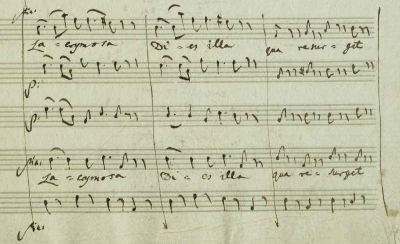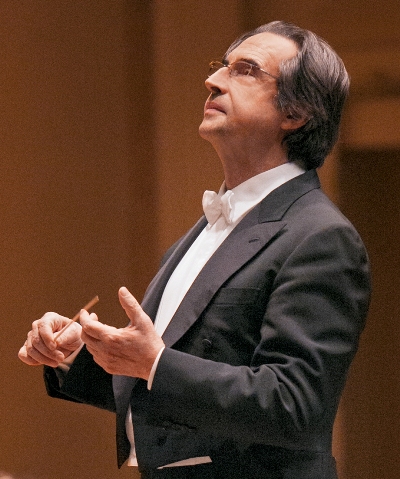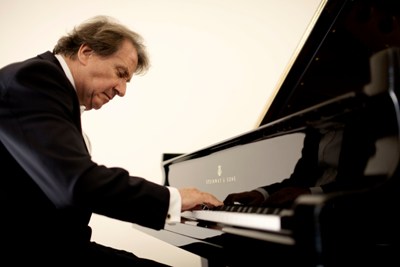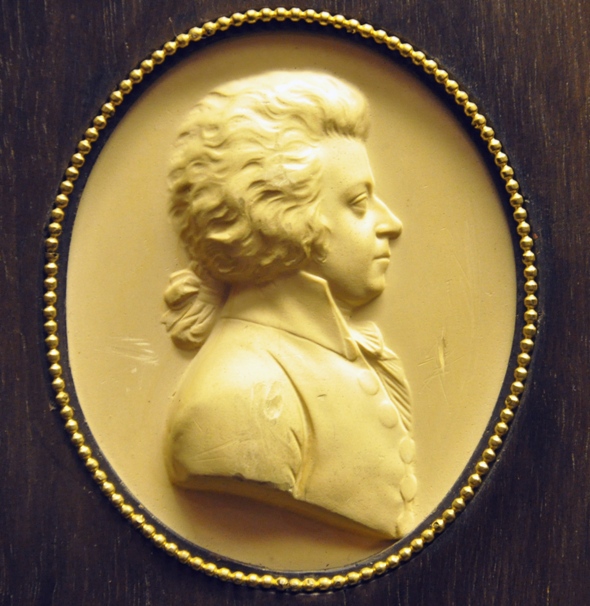Balm for a winter weekend, Mozart’s Requiem casts warming glow in hands of Muti and CSO
Review: Chicago Symphony Orchestra and Chorus in Mozart’s Requiem; pianist Rudolf Buchbinder in Mozart’s Piano Concerto No. 24, Riccardo Muti conducting, at Orchestra Hall through Feb. 24.
By Nancy Malitz
Why Riccardo Muti chose to leave the mild Adriatic for the frigid winds of Chicago in February is anybody’s guess, but the opportunity to bask in the rounded beauty of the Mozart Requiem at Orchestra Hall this week was a balm indeed.
It was a sad time for the musical community, which had lost two respected musicians within days of each other — cellist Leonard Chausow, who had been with the Chicago Symphony Orchestra for 47 years, and journalist and broadcaster Andrew Patner, who had explored every nook and cranny of the Chicago arts scene for decades.
 By astonishing coincidence the scheduled program, dedicated to their memory, included the Requiem by Mozart, whose own life slipped away from him as he wrote it. The first few bars of the Lacrymosa movement, a part of the Dies Irae he scored for the chorus, is the last passage that remains in Mozart’s hand.
By astonishing coincidence the scheduled program, dedicated to their memory, included the Requiem by Mozart, whose own life slipped away from him as he wrote it. The first few bars of the Lacrymosa movement, a part of the Dies Irae he scored for the chorus, is the last passage that remains in Mozart’s hand.
Others close to Mozart, dead at 35, would help to bring the Requiem to some sort of completion on behalf of his debt-ridden widow. But the music his admirers painstakingly provided was no match for what Amadeus had penned. His Lacrymosa soars aloft with unforgettable sadness. What follows is like the air being let out of a balloon. A thing of extraordinary beauty, exquisitely painful, simply evanesces too soon.
 There are other famous works left unfinished by great composers — Bach’s Art of the Fugue and Schubert’s Symphony No. 8 (“Unfinished”) among them, along with significant items by Puccini, Bartok, Mahler and Ives. But the loss in Mozart’s case is especially touching, and Muti led his superbly prepared Chicago Symphony Orchestra and Chorus with elegance and restraint.
There are other famous works left unfinished by great composers — Bach’s Art of the Fugue and Schubert’s Symphony No. 8 (“Unfinished”) among them, along with significant items by Puccini, Bartok, Mahler and Ives. But the loss in Mozart’s case is especially touching, and Muti led his superbly prepared Chicago Symphony Orchestra and Chorus with elegance and restraint.
The program, which repeats Feb. 21 and 24, features a fine quartet of soloists long known to Muti — soprano Rosa Feola, mezzo-soprano Alisa Kolosova, tenor Saimir Pirgu and bass Michele Pertusi. Just two weeks before, Kolosova was trumpeting full throttle in Prokofiev’s “Alexander Nevsky” for audiences in Chicago and Carnegie Hall. Who knew she could also apply the velvet?
The chorus had been through their own workout in Chicago and at Carnegie, but director Duain Wolfe had them re-focused and ready for the Mozart nevertheless. The choristers achieved pinpoint articulation in the fugal numbers and imbued even the softest passages with richly saturated hues. Trombones, basset horns and bassoons shaded the orchestral spectrum toward twilight.
 The program began with a great Mozart work entirely complete — the Piano Concerto No. 24 in C Minor, featuring the Viennese pianist Rudolf Buchbinder in a formidable performance that was obviously a meeting of the minds with Muti. Buchbinder is an intensely focused musician and something of a completist. He has recorded the complete Haydn sonatas for piano, the complete Mozart concertos, the complete Beethoven sonatas, etc. He prefers to work from first editions and manuscript facsimiles so that he is not persuaded by editorial markings that reflect intervening fashions of interpretation. He is also a conductor, and his playing has that broad awareness, sensitive to every other line that’s being drawn in the orchestra, that one also finds, to name one example, in former CSO music director Daniel Barenboim.
The program began with a great Mozart work entirely complete — the Piano Concerto No. 24 in C Minor, featuring the Viennese pianist Rudolf Buchbinder in a formidable performance that was obviously a meeting of the minds with Muti. Buchbinder is an intensely focused musician and something of a completist. He has recorded the complete Haydn sonatas for piano, the complete Mozart concertos, the complete Beethoven sonatas, etc. He prefers to work from first editions and manuscript facsimiles so that he is not persuaded by editorial markings that reflect intervening fashions of interpretation. He is also a conductor, and his playing has that broad awareness, sensitive to every other line that’s being drawn in the orchestra, that one also finds, to name one example, in former CSO music director Daniel Barenboim.
Mozart wrote only two piano concertos in the sound world of a minor key — this one and No. 20 in D Minor. Most Mozart lovers will say that one or the other is their favorite of all the Mozart concertos, but that should not suggest there are no new insights to be found. Indeed, the 68-year-old pianist and 73-year-old maestro found fresh lyricism and playfulness in this work that shares some of the somber coloring of the Requiem itself.
The Chicago Symphony Orchestra, which sounded superb all night, produced some star turns of its own from the winds and brass, among them clarinetists John Bruce Yeh and J. Lawrie Bloom, who evoked a mysterious otherworld in their turns on the bassett horn and Michael Mulcahy, whose trombone was entrusted, as the Requiem has it, to “sound through the tombs of all the lands.”
Related Links:
- Performance location, dates and times: Visit CSO.org
- Preview of the Chicago Symphony’s remaining concerts of the 2014-15 season: Read it at ChicagoOntheAisle.com
- A look ahead to the CSO’s 2015-16 season: Read it at ChicagoOntheAisle.com
Tags: Alisa Kolosova, Andrew Patner, Chicago Symphony Orchestra, Duain Wolfe, Leonard Chausow, Michele Pertusi, Riccardo Muti, Rosa Feola, Rudolf Buchbinder, Saimir Pirgu


